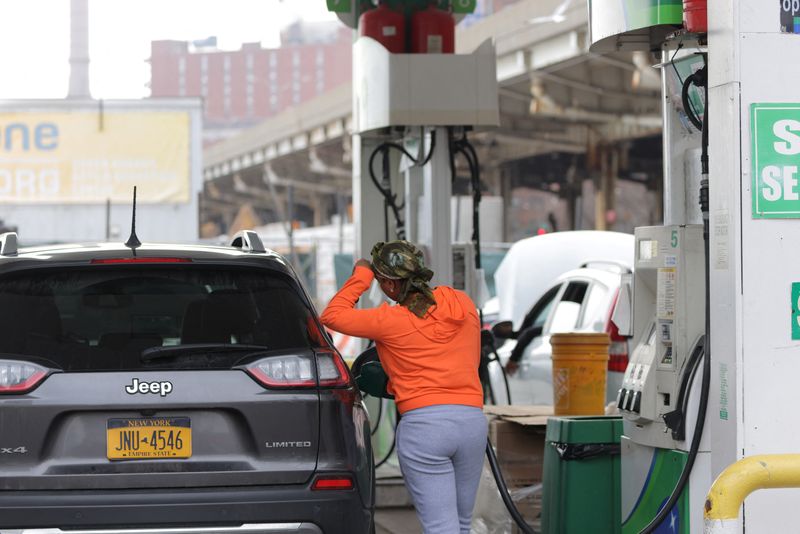By Jason Lange and Ann Saphir
WASHINGTON (Reuters) - U.S. consumers plan to cut spending on restaurant meals and movies if gasoline prices keep rising as Russia's invasion of Ukraine rattles the global economy, according to a Reuters/Ipsos poll completed on Thursday.
Some 54% of U.S. adults expect to spend less on meals out if gasoline prices rise to between $6 and $7 per gallon, the poll found. Forty-nine percent said they would trim spending on movies and other entertainment. Some 60% said they would not drive as far for leisure activities.
Automobile club AAA said the average price at the pump on Thursday was about $4.32 per gallon, up from $3.48 a month ago. It said that gasoline prices could rise to a range of $6 to $7 per gallon if crude oil prices hit $200 per barrel.
Washington and its allies have responded to Russia's attack on Ukraine, now in its third week, with unprecedented sanctions against Moscow, including a U.S. ban on Russian energy imports.
The sanctions have sent Russia's economy into a tailspin. U.S. consumers are also bearing costs as the conflict added to already high gasoline prices and helped send them to record highs, crimping household budgets.
Forty-seven percent of respondents in the poll said they would spend less on home improvements like furniture and appliances if gasoline prices kept rising.
Lower income consumers already appear to be pulling back sharply on some spending, Bank of America (NYSE:BAC) economist Anna Zhou said in a report, citing slower growth in credit card purchases of clothing in the four weeks through March 5.
The bank said lower-income consumers appeared to be relying more on credit cards than debit cards when buying gasoline, a possible sign of stressed finances.
Some 82% of poll respondents buy fuel for a vehicle driven by someone in their family, with almost a third spending $51 to $100 each week filling their tanks and another third spending more than $100 weekly.
The carnage of the Russian invasion - with Russian forces increasingly shelling urban areas - has fueled an outrage that has led many Americans to say sanctions are worthwhile despite higher fuel prices.
Still, even fast-rising gas prices may not change the outlook for the economy as a whole.
"In normal times higher crude oil prices always translate into weaker real consumer spending," Nomura economist Robert Dent said.
But these times may be different: U.S. households are flush with $2.6 trillion in excess cash built up from circumscribed living during the pandemic and massive government aid packages, and for many, the massive recent drop in COVID-19 cases is a license to spend, even if prices are rising fast, Dent said. "The underlying fundamentals for growth and aggregate demand remain very, very strong," he said.
Higher gas prices will not force most Americans to make uncomfortable cutbacks on basics, the poll showed.

Some 64% of respondents, for instance, said higher gas prices wouldn't change what they spend on medicines; 58% expected no change to spending on utilities. About half said they'd keep spending on groceries unchanged, with 28% anticipated spending less and 18% expecting to spend more.
The Reuters/Ipsos poll was conducted online, in English, on Wednesday and Thursday throughout the United States, gathering responses from 1,005 adults. It has a credibility interval, a measure of precision, of about 4 percentage points.